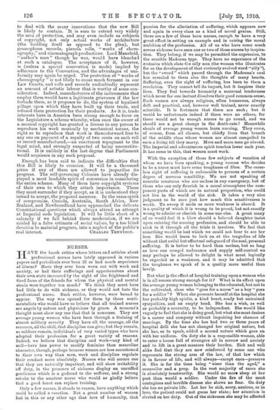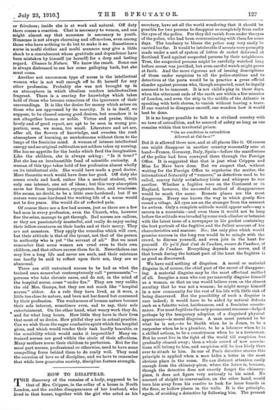NURSES. H AVE the harsh critics whose letters ani articles about
professional nurses have lately appeared in various papers and periodicals ever been ill or had much experience of illness P Have they ever been worn out with work and anxiety, or had their sufferings and apprehensions about their own state increased by the sight of the frightened and tired faces of the friends for whom the physical and mental strain were together too much ? We think they must have had little to do with sickness, or they would not hate the professional nurse. Such critics, however, were bound to appear. The way was opened for them by those senti- mentalists who would have us believe that all trained nurses are angels by nature and physicians by grace. A. moment's thought must show any one that that is nonsense. They are average young women who have been through a training of almost military severity They have all the courage, all the resource, all the skill, that discipline can give; but they remain, as soldiers remain, individuals of very varied types who have adopted their profession for a great variety of reasons. Indeed, we believe that discipline and work—any kind of mill—have less power to modify feminine than masculine character, though, perhaps because women are less accustomed to their own way than men, work and discipline regulate their conduct more absolutely. Nurses who will assure one that they are naturally impatient, and will show irritability off duty, in the presence of sickness display an unruffled gentleness which is a godsend to the sufferer, and a strong rebuke to the amateur nurse who would so gladly believe that a good heart can replace training.
Only a few nurses, it stands to reason, have anything which could be called a vocation. Not a great number of women feel in this or any other age that love of humanity, that passion for the alleviation of suffering, which appears now and again in every class as a kind of moral genius. Still, there are a few of these born nurses, enough to have a very great effect in setting an example and in raising the moral ambition of the profession. All of us who have come much across sickness have seen one or two of these nurses by inspira- tion. They belong, if we may be permitted the expression, to the sensible Madonna type. They have no experience of the ecstasies which elate the silly nun (the woman who illustrates for us the development of that curiously evolved word "silly"). but the " sword " which passed through the Madonna's soul has revealed to them also the thoughts of many hearts. Suffering, even the sight of suffering, has been to them a revelation. They cannot tell its import, but it inspires their lives. They feel towards humanity a maternal tenderness which never for one instant dissolves their good common-sense. Such women are always religious, often humorous, always deft and practical, and, however well trained, never exactly scientific. It is fortunate that there are such ; but it would be unfortunate indeed if there were no others, for there would not be enough nurses to go round, and we should see a great change in the death-rate ! Meanwhile shoals of average young women learn nursing. They come, of course, from all classes, but chiefly from that branch of the middle class whose women are almost compelled to earn a living till they marry. More and more men go abroad. The Imperial and adventurous spirit touches lower each year. It has come to this, that women must work.
With the exception of those few subjects of vocation of whom we have been speaking, a young woman who decides to be a nurse must have some toughness of fibre. The cease- less sight of suffering is unbearable to persons of a certain degree of nervous sensibility. We are not speaking of neurotic creatures who are useless in any emergency, but of those who can only flourish in a moral atmosphere the com- ponent parts of which are in natural proportion, who could not live in the world of the sick. It takes a very nice judgment to be sure just how much this sensitiveness is worth. To sweep it aside as mere weakness is absurd. It is a quality of which it is wrong to be proud, but not exactly wrong to admire or cherish in some one else. A great many of us would feel it a blow should a beloved daughter insist upon entering the nursing profession, and should be able to stick to it through all the trials it involves. We feel that something would be lost which we could not bear to see her lose. She would learn to look on at the tragedies of life without that awful but effectual safeguard of the soul, personal suffering. It is better to be hard than useless, but so long as love can compel endurance and supply self-control we may perhaps be allowed to delight in what must logically be regarded as a weakness, and it may be admitted that the toughness we speak of is a quality more useful than lovely.
But what is the effect of hospital training upon a woman who is in all senses strong enough for it P What is its effect upon the average young woman belonging to the educated, but not to the cultivated, class who "goes for a nurse" as a boy " goes for a soldier " ? When she presents herself at the hospital she has probably high spirits, a kind heart, ready but untrained sympathies, and an empty head. She has a wish, as well as probably a necessity, to be independent. She would like vaguely to feel that she is doing good, but what she most desires is a career and company without impairing her chances of marriage. By the time she has had two or three years of hospital drill she has not changed her original nature, but she has, so to speak, added a second nature which goes on with her uniform. On duty she is a responsible woman, able to enter a house full of strangers all in sorrow and anxiety and to lift in a great measure their burden. Sick and well alike feel that they are now reinforced by some one who represents the strong arm of the law, of that law which is in favour of life, and will always—except once—preserve it. She is for the time being " wiser than the aged," a counsellor and a prop. In the vast majority of cases she is absolutely trustworthy. She would no more sleep at her post than would a soldier. Under the fire of the most contagions and terrible disease she shows no fear. On duty she has no private life. Let her be sick, sorry, anxious, or in love, the patient could not guess her state ; her attention is riveted on her duty. Out of the sickroom she may be affected or frivolous ; inside she is at work and natural. Off duty there cornea a reaction. Chat is necessary to women, and one might almost say that nonsense is necessary to youth. Nonsense is not always charming and offencelees, even among those who have nothing to do but to make it so. Sometimes a nurse in mufti clothes and mufti manners may give a little 'shock to a convalescent whose gratitude and dependence have been mistaken by himself (or herself) for a deep and lasting regard. Chasm la Nature. We know the result. Some one is always distressed to see her come galloping back, but she must come.
Another not uncommon type of nurse is the intellectual woman who is not well enough off to fit herself for any other profession. Probably she was not brought up in an atmosphere in which idealism renders intellectualism fragrant. There is a craving for knowledge which takes hold of those who become conscious of the ignorance of their surroundings. It is like the desire for money which seizes on those who are oppressed by its scarcity. It is in itself, we suppose, to be classed among good desires, but somehow it is not altogether human or noble. Virtue and praise, things lovely and of good report, are apt to be seen in wrong pro. portion, seen, we mean, too small. Literature and art are, after all, the flowers of knowledge, and sweeten the rank atmosphere of learning, so unwholesome without them to the lungs of the feminine mind. A woman of intense intellectual energy and no original cultivation not seldom takes up nursing. She has no appetite for the books which feed the imagination. Like the children, she is always asking : "Is it true ?" But she has an inexhaustible fund of scientific curiosity. A woman of this type takes hold of her profession almost wholly on its intellectual side. She would have made a good doctor. More theoretic work would have done her good. Off duty she seems crude and hard, rather like a medical student, with only one interest, one set of ideas ; but this very absorption saves her from impatience, repugnance, fear, and weariness. She seems, no doubt, to be a little case-hardened; but if no nurses were ease-hardened the working life of a nurse would not be five years. She would die of reflected pain.
Of course there are a few bad nurses, just as there are a few bad men in every profession, even the Church, who, however fine the seine, manage to get through. Bad nurses are callous, or they are passionately masterful, and really do enjoy seeing their fellow-creatures on their backs and at their mercy. They are not monsters. They apply the remedies which will cure, but their attitude is that of the tyrant, not that of the person in authority who is yet "the servant of all." But we must remember that some women are cruel even to their own children, and that others excuse them for it. Nevertheless one may live a long life and never see such, and their existence can hardly be said to reflect upon their sex, they are so abnormal.
There are still untrained nurses to be had as what the trained ones somewhat contemptuously call "permanents,"— persons who take chronic cases, and do not, in the mind of the hospital nurse, come "under fire." They are very unlike the old Mrs. Gamps, but they are not much like "hospital nurses " either. As a rule they have lived, as it were, a little too close to nature, and been not hardened but coarsened by their profession. The weaknesses of human nature become their sole interest, sometimes even, sad to say, their sole entertainment. On the other hand, what weary work they do, • and for what long hours. How little they have in their lives that most of us desire. How pitiful they are in actual practice. Can we wish them the eager combative spirit which the hospital gives, and which would render their task hardly bearable, or the sensibility which would make it impossible? Many un- trained nurses are good within the circle of their affections. Many mothers nurse their children to perfection. But for the most part nurses, professional or otherwise, need to have some compelling force behind them to do really well. They need the coercion of lore or of discipline, and we have to remember that while love generates anxiety, discipline fosters strength.







































 Previous page
Previous page